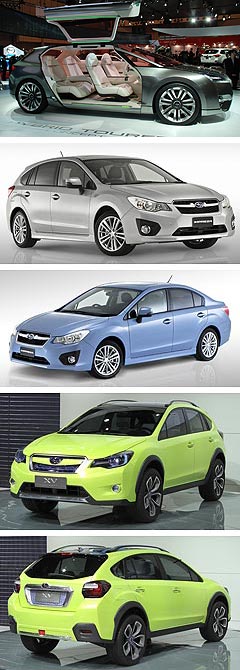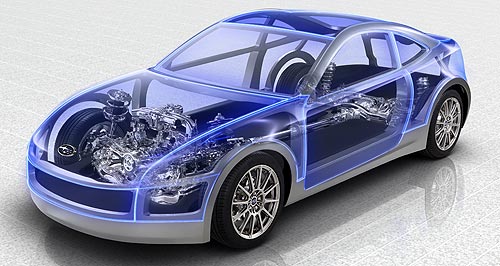Make / Model Search
News - SubaruSubaru promises four all-new modelsComing: Subaru's rear-drive, boxer-powered 'Subarota' coupe - co-developed with Toyota - will be launched in Japan in the second quarter of 2012. ‘Subarota’ to be first of three new models and a hybrid as Subaru Oz eyes 50k sales8 Jul 2011 SUBARU has committed to releasing three additional models and its first hybrid vehicle within the next five years, as part of an ambitious mid-term business plan that targets 900,000 annual global sales – including 50,000 in Australia – by March 2016. It is not yet clear which of the four all-new models will be sold here but the first to appear should be the ‘Subarota’, the rear-drive boxer-powered coupe that was co-developed with Toyota and will be launched in Japan in the second quarter of 2012. The landmark Subaru sportcar’s Australian future will not be known until October but almost certain to be sold here next year is the production version of the Impreza-based XV crossover concept that is yet to be officially confirmed for showrooms but is likely to be the second of Subaru’s four “all-new” models. Also based on the fourth-generation Impreza small car, which made its Australian debut alongside the XV concept at last week’s Melbourne motor show but might not be seen here until mid-2012, are replacements for the existing WRX and STi. Like the XV, the next-generation WRX and STi models are set to wear a unique bodyshell and will be released as stand-alone models separate to the Mk4 Impreza sedan and hatch range, but could be up to two years away. Rounding out the four additional models will be Subaru’s first hybrid model – likely to be based on the Hybrid Tourer concept that debuted at the 2009 Tokyo motor show – which has now been confirmed for launch in Japan in 2013.  Left: Subaru Hybrid Tourer concept, new Impreza, XV crossover. Left: Subaru Hybrid Tourer concept, new Impreza, XV crossover.Similar in concept to Toyota’s upcoming Prius V people-mover, the Hybrid Tourer show car featured a unique hybrid system employing two electric motors – one at either end of the vehicle – plus regenerative braking and idle-stop systems and a lithium-ion battery pack similar to that found in Subaru’s plug-in Stella EV concept. At the time, Subaru said its direct-injection boxer four-cylinder engine was the hybrid wagon’s primary power source during normal driving, with the 20kW rear electric motor assisting the petrol engine during acceleration and the 10kW front motor also kicking in during uphill acceleration. The Hybrid Tourer employed a full parallel, or two-mode, hybrid drive system like Toyota’s expanding Prius family, but with a rear electric motor providing drive for take-off and low speeds, such as parking. Subaru’s first hybrid vehicle will play an important role in achieving its lofty new target to reduce the fuel consumption of its new model fleet by 30 per cent between now and March 2016. As part of the five-year growth strategy – dubbed ‘Motion-V’ - it announced this week, Subaru said it plans to reduce the development costs of new vehicles by 20 per cent. It has also vowed to “become the world’s leading brand in safety performance by providing all-around safety that comprises risk-avoidance technologies (active safety), systems in collision safety (passive safety), and pre-crash safety features”. The latter will include EyeSight, the stereo camera-based pre-crash safety system that will make its Australian debut next year in the Liberty. As part of its mid-term management plan, Subaru forecast a 3.6 per cent sales decline to 633,000 units and a 64.3 per cent slump in operating income to 30 billion yen ($A3.4b) for its current financial year ending March 31, 2012, following Japan’s devastating March 11 earthquake. However, Subaru says it expects annual sales to increase by 40 per cent to 900,000 by March 2016 – and to one million over the next decade – and has targeted an operating income goal of 120 billion yen ($A13.7b) with a six per cent operating profit margin. Much of the growth is forecast to come from the North American and Chinese markets. Of the 657,000 vehicles it sold globally last year, Subaru sold a record 264,000 vehicles in the US, where it aims to boost sales by 24 per cent to 380,000 over the next five years, while China sales are expected to almost triple to 180,000 annual sales by 2016. Subaru said it would soon begin production in China, where it is expected to form a joint-venture with Chery, the world’s most populous nation’s largest vehicle exporter, and start kit assembly of its vehicles in Malaysia to break into the ASEAN free-trade zone. Subaru also said it would refurbish its main Gunma plant in Japan to produce passenger cars instead of mini-cars, expand production of its new-generation boxer engine at the Oizumi plant, and continue production of Toyota’s Camry at its Indiana plant in the US. However, it said all of Subaru’s mini or ‘kei’ cars would be supplied by Toyota’s Daihatsu brand under an OEM agreement by mid-2012. Subaru said it would “study enhancement of product appeal” of both the Subarota coupe and its Toyota-supplied kei-car, but the deal appears to end hopes for a Subaru-built compact car from the one-time baby-car specialist. Subaru has not designed, developed or built its own light car since the demise of the R1/R2 sub-B-segment kei-cars from 2003 to 2010, and for the past decade has relied on Suzuki (Ignis) and then Toyota (mostly Yaris-derived vehicles such as the Verso) and Daihatsu (Sirion and Move, among a string of other models) to provide its compact cars. Subaru expects Japan to be its third largest market in five years with 160,000 sales a year, while Europe is forecast to account for 60,000 annual sales by 2016. Right behind Europe, however, will be Australia – Subaru’s fourth largest single market with 50,000 annual sales, representing a 25 per cent increase on the 40,539 sales it achieved in its 2010 financial year and 5.5 per cent of global Subaru sales (down from about six per cent currently). In calendar year 2010 Subaru Australia sold 40,025 vehicles – 9.6 per cent up on 2009. However, it has admitted quake-related production delays could see it go without its volume-selling Impreza models for six months from October, and the popular WRX and STi versions could also be unavailable until their replacements eventually arrive.  Read more5th of July 2011  Subaru coupe not yet 86’d for OzThe answer to if/when Subaru’s rear-drive coupe arrives in Oz is three months away5th of July 2011  Subaru faces Impreza insufficiencyJapanese quake to dry up Impreza supplies as Subaru delays next Impreza until 201228th of June 2011  AIMS: Subaru set to Impreza MelbourneNew Impreza, XV crossover, EyeSight tech and mad Liberty racer to star for Subaru14th of June 2011  AIMS: Subaru confirms ImprezaSubaru’s next-generation Impreza to make right-hand drive world debut in Melbourne6th of June 2011  AIMS: Subaru confirms XV for showXV Concept set to be joined by other Subaru stars at Melbourne motor show26th of April 2011  Baby Subaru might returnTrue Subaru light-car is not dead forever, despite re-badging Toyotas and Daihatsus |
Click to shareSubaru articlesResearch Subaru Motor industry news |











Facebook Twitter Instagram